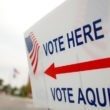Remembering Molly—We know that a great many of you first subscribed to the Spectatorbased on the recommendation of Molly Ivins, the iconic liberal columnist and humorist who, as you no doubt know, died on January 31 after a long fight with cancer.
Molly got to know our longtime editor Ben A. Franklin back in the days when they were both reporting for the New York Times. After Ben took over the editorship of the Spectator, he asked Molly for a quote to use in our subscription promotions. She did even better, describing the newsletter as a “must-read” in a generous 300-word letter that’s been part of our new-subscriber mailings ever since. We can’t count the number of notes and e-mails that it has generated saying, roughly, “If Molly says it’s good, I’ll try it.”
“What people in our business always say about the Washington Spectator is that it picks up where I.F. Stone left off,” Molly wrote. “Well, of course, Izzy is flat irreplaceable. But believe me, the Spectator is close enough for government work.” Thanks, Molly. We miss you terribly; we miss your fearless voice and the way you brightened our day. That makes two of you who are irreplaceable.
Wal-Mart Comes Around?—The latest political odd couple is the SEIU, one of the nation’s largest unions, and Wal-Mart, that union-busting, community-ravaging behemoth. The two put aside their differences recently to issue a joint statement calling for universal health care by 2012.
The alliance, naturally, had an odd beginning. Until 2005, Wal-Mart didn’t provide any health coverage for the majority of its employees. SEIU President Andy Stern had been a board member of Wal-Mart Watch, a “nationwide campaign to reveal the harmful impact of Wal-Mart on American families and demand reform of their business practices.” Last year Stern wrote letters to the CEOs of every Fortune 500 company, urging them to join him in pushing to revamp health care policy. Unexpectedly, Wal-Mart CEO Lee Scott was one of the few who responded.
Their plan offers few specifics, preferring instead to focus on broad principles—universal coverage; individual responsibility; increased cost efficiency; business; government and citizens working together.
The relationship is not without its critics in the labor movement, who allege that Stern is helping Wal-Mart get away with a nifty piece of PR. “It is not surprising, albeit disingenuous, that Wal-Mart now wants to support universal health care despite having one of the worst health care records in America,” said Paul Blank, campaign director for Wake Up Wal-Mart, which is funded by the United Food and Commercial Workers Union. “But what is surprising is how anyone, in good conscience, would give Wal-Mart a stage to make empty statements that will not give health care to one more uninsured Wal-Mart worker.” Yet as Stern would likely argue, with health care becoming a leading issue in the ’08 presidential campaigns, these “empty statements” may soon turn out to be of great significance.
Paper Trail—Florida. The state conjures up images of Disney World, Miami Beach, the Everglades, hurricanes, elderly Jews and, most recently, disputed elections. There was 2000. Then there was 2006. As we reported, during a Congressional election in Sarasota County—to fill Katherine Harris’s old seat, no less—18,000 electronic ballots failed to record a vote for either candidate. Republican Vern Buchanan was declared the winner over Democrat Christine Jennings by 369 votes.
Congressman Rush Holt (D-NJ) has re-introduced his Voter Confidence and Increased Accessibility Act (HR 550), providing that every vote be accompanied by a verifiable paper record. In the last Congress, Holt’s bill had 222 bipartisan co-sponsors, but Republicans refused to allow a vote on it. With Democrats in control, the prospects for Holt’s bill have increased measurably, and Senator Dianne Feinstein of California plans to sponsor a companion bill in the Senate.
The legislation got an unpredicted assist at the beginning of the month when new Florida governor Charlie Crist declared that he was scrapping the state’s touch-screen voting machines in favor of optical scanners that read voter-marked paper ballots. He made the announcement in Palm Beach County, site of the notorious butterfly ballot of 2000, when many residents accidentally voted for Pat Buchanan instead of Al Gore. Twenty-eight states have thus far adopted legislation requiring paper ballots to be used in local polling locations. Holt hopes that his measure will be implemented nationally before another election fiasco can occur in 2008.




0 Comments